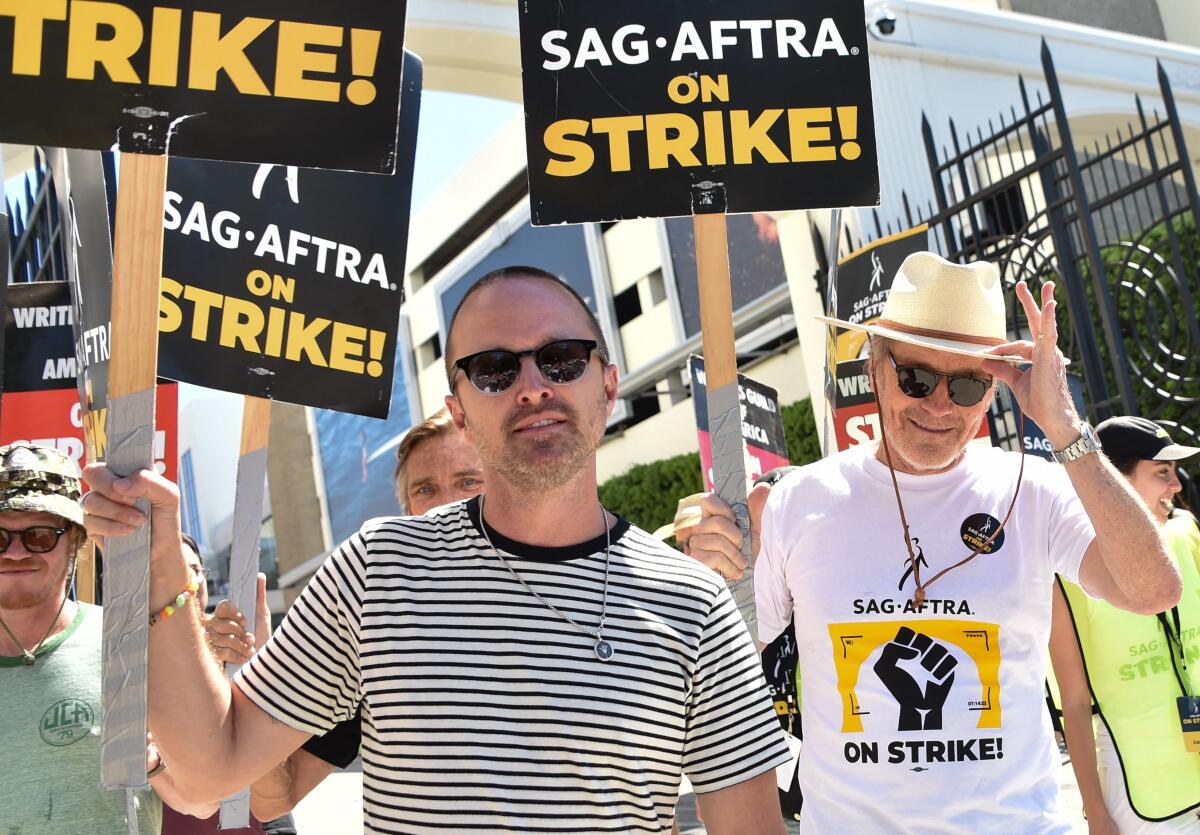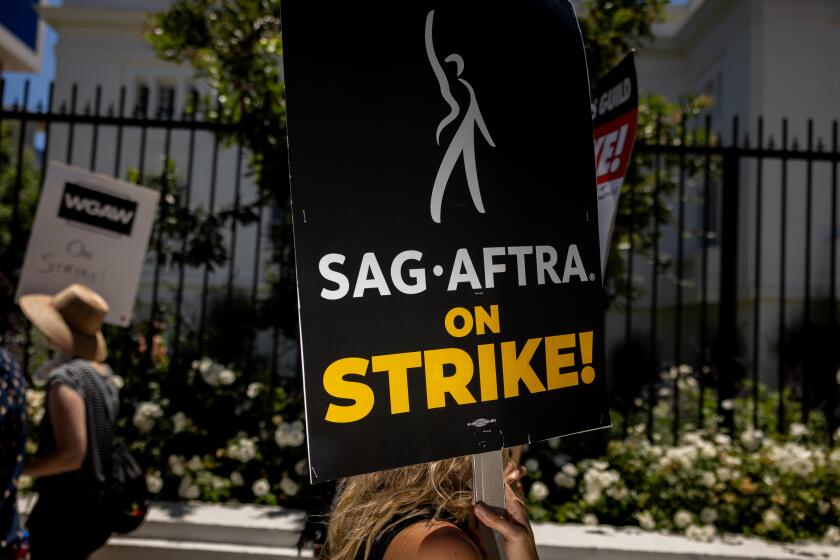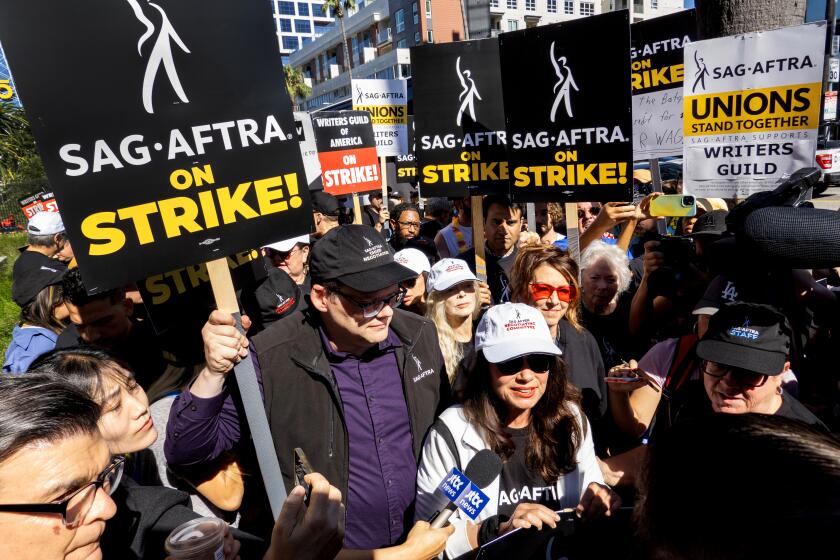Aaron Paul says he doesn’t get paid for ‘Breaking Bad’ streaming on Netflix, and wants streamers to ‘pony up’

“Breaking Bad” is nothing without Aaron Paul’s Jesse Pinkman. And yet Netflix isn’t paying him for streaming the hit show on its platform, according to Paul.
“I don’t get a piece from Netflix on ‘Breaking Bad’ to be totally honest,” the Emmy-winning actor told “Entertainment Tonight Canada” last week. “And that’s insane to me.”
Paul joined other cast members of the hit crime drama on the SAG-AFTRA and WGA picket lines on Aug. 29, alongside Bryan Cranston and Jesse Plemons, striking in front of Sony Pictures Studios in Culver City, the studio behind “Breaking Bad.”
SAG-AFTRA has approved a deal from the studios to end its historic strike. The actors were on strike for more than 100 days.
The relationship between Netflix and “Breaking Bad” stretches back to 2013, when streaming had not yet become the force it is today. The show became a hit on the streamer and the benefits were mutual: “Breaking Bad” widened its reach and popularity, which helped fuel the show to continue filming, and Netflix used the traffic bump to better establish its grip on Hollywood. And recent deals with Netflix, such as show creator Vince Gilligan’s five-year deal with the streamer, has continued to keep the “Breaking Bad” universe relevant for newer audiences.
“Shows live forever on these streamers and it goes through waves,” Paul continued from the picket line. “And I just saw the other day that ‘Breaking Bad’ was trending on Netflix, and it’s just such common sense, and a lot of these streamers, they know they have been getting away with not paying people just fair wage and now it’s time to pony up.”
Despite Netflix and other streamers’ role in upending Hollywood’s television and film industry, much of such compensation Paul and other actors seek may also depend on the kinds of deals the studios strike with streaming giants.
Amid a dearth of fresh content during the Hollywood strikes, consumers are rediscovering older series and movies to keep themselves entertained.
Today, Sony Pictures Television is one of the few remaining major studios without a streaming platform. It has been able to still make profits in the streaming age by licensing its shows to streamers, such as Netflix (“Cobra Kai”), Peacock (“Community”) or Amazon Prime Video (“The Boys”). Sony Pictures has a licensing deal with Netflix to stream the show on its platform through 2025, according to The Wrap.
It’s not immediately clear how onscreen talent is paid from these deals, but how it pays its writers can offer a glimpse into what the striking unions have called unfair compensation for their work when it comes to streaming.
For example, NBCUniversal has a licensing deal with Netflix to stream “Suits.” Writers earn residuals when a show is licensed to a streaming service, such as Netflix, but in the event of skyrocketing viewership, the writers do not immediately get more money based on the surge. Instead, increased viewership will factor into how much Netflix or other studios pay the next time they license “Suits.”
In an email sent out Sunday, Jodi Long — president of the SAG-AFTRA’s Los Angeles local — stressed solidarity with other unions pushing for improved pay and working conditions.
Some members of the Writers Guild of America have cited the “Suits” phenomenon as an example of why the union is striking for higher pay based on a show’s success.
“It would be better if we got paid more money when our viewership numbers went up,” said Aaron Korsh, creator of “Suits.” “I don’t know if that means we’re going to achieve it retroactively, but I do think it is reasonable and achievable to expect residuals to go up, commensurate with increased views.”
A Netflix spokesperson declined to comment for this story, and instead directed The Times to Sony Pictures, who did not immediately respond to inquires Tuesday morning.
“We’re here at Sony, this is the studio that produced our shows,” Cranston said while addressing picketers last week in front Sony Pictures Studios. “It is done specifically ... to let them know that we’re here and we’re raising our voice. We’re not making them the enemy, they are not villains. These are people we all will be working with once again at some point. We just want them to see reality and fairness and come back to the table and talk to us.”
Paul, who earned three Emmys for his portrayal of Pinkman in “Breaking Bad,” said he remains hopeful about the direction of negotiations around actors getting more residuals from streaming, saying with a shrug, “We’re not going anywhere, so they gotta do something, you know what I mean? I’m feeling very optimistic.”
Times staff writer Wendy Lee contributed to this report.
More to Read
The complete guide to home viewing
Get Screen Gab for everything about the TV shows and streaming movies everyone’s talking about.
You may occasionally receive promotional content from the Los Angeles Times.










